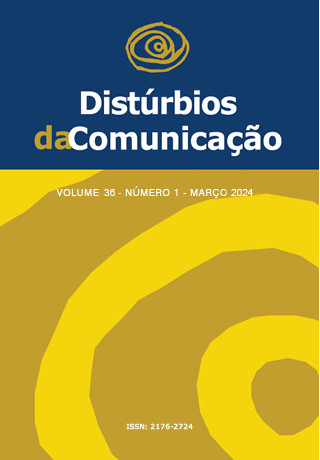Processo de ensino e aprendizagem no período de suspensão das aulas presenciais em virtude da pandemia de COVID-19
estudo com professores
DOI:
https://doi.org/10.23925/2176-2724.2024v36i1e62672Palavras-chave:
Fonoaudiologia, Aprendizagem, Educação à Distância, COVID-19, Professores EscolaresResumo
Introdução: Sabe-se que durante o período da pandemia do COVID-19, escolas e professores precisaram adaptar-se com alternativas para dar continuidade às aulas. Objetivo: Investigar estratégias e recursos pedagógicos de aprendizagem adotados por professores da rede pública e/ou privada de ensino, do interior de um estado brasileiro, durante o período de suspensão das aulas presenciais, em virtude da Pandemia de Covid-19 e seus efeitos para estudantes com e sem dificuldades de aprendizagem. Método: Aplicação de questionário on-line utilizando a ferramenta Google Forms para 37 professores atuantes do 1° ao 5° ano da rede pública e/ou privada no interior do estado, que tenham trabalhado remotamente durante a Pandemia no período de suspensão das aulas presenciais. Esse material continha questões de múltipla escolha e dissertativas e averiguava a forma de trabalho durante este período, as estratégias e os recursos adotados. Resultados: Os resultados mostraram que as estratégias mais utilizadas pelos professores foram uso de materiais impressos. Os professores relataram as dificuldades e os desafios em adotar o ensino remoto, referentes à desigualdade social dos alunos, a dificuldade de adaptação dos professores a esta forma de ensino e ao empenho restrito das famílias no processo de aprendizagem. Conclusão: foi possível verificar como ocorreu o processo de adaptação ao ensino remoto pelos professores. Verifica-se a necessidade de explorar o trabalho conjunto com a Fonoaudiologia, visando minimizar as dificuldades apresentadas pelos estudantes, o que auxiliaria no processo de ensino e aprendizagem dos alunos que, posteriormente, poderiam vir a ser futuros pacientes do setor de Fonoaudiologia.
Downloads
Referências
Ministério da Saúde. Sobre a doença. (2020) Disponível em: https://coronavirus.saude.gov.br/sobre-a-doenca
World Health Organization. (2020) Disponível em: https://www.who.int/
Camacho, ACLF, Fuly, PSC, Santos, MLSC & Menezes, HF. (2020). Students in social vulnerability in distance education disciplines in times of COVID-19. (2020). Research, Society and Development, 9(7):1-12, e275973979.
Brasil. Lei de Diretrizes e Bases - Lei nº 9.394, Artigo 32, inciso 4 da LDB. (1996). Disponível em: https://presrepublica.jusbrasil.com.br/legislacao/109224/lei-de diretrizes-e-bases-lei-9394-96#art-32
Appenzeller, S. et al. New Times, New Challenges: Strategies to Ensure Equal Access to Emergency Remote Education. Revista Brasileira de Educação Médica [online]. 2020, v. 44, n. Out 2020. ISSN 1981-5271.
Chechia, VA e Andrade, AS The children’s school performance in the perception of parents of students with school success and school failure. Estudos de Psicologia (Natal) [online]. 2005, v. 10, n. 3 ISSN 1678-4669.
Feitosa, MC Moura, PS Ramos, MSF Lavor, OP. Remote Education: What Do Students and Teachers Think. In: Congress on technology in education (CTRL+E), 5, 2020, Evento Online. Anais [...]. Porto Alegre: Sociedade Brasileira de Computação, 2020. p. 60-68.
Celes RS, Rossi TRA, Barros SG, Santos CML, Cardoso C. Telehealth as state response strategy: systematic review Rev Panam Salud Publica. 2018; 42: e84.
Dimer, NA et al. The COVID-19 pandemic and the implementation of telehealth in speech-language and hearing therapy for patients at home: an experience report. CoDAS [online]. 2020, v. 32, n. 3. ISSN 2317-1782.
Melo, JKO et al. Manchester de Teachers’ knowledge on Educational Speech Language-Hearing Pathology and the relevance of communication to learning. Revista CEFAC [online]. 2021, v. 23, n. 1 ISSN 1982-0216.
Tabile, AF, Jacometo, MCD. Factors influencing the learning process: a case study. Rev. psicopedag. [online]. 2017, vol.34, n.103, pp. 75-86. ISSN 0103-8486.
Downloads
Publicado
Edição
Seção
Licença
Copyright (c) 2024 Edna Ribas Ferreira, Luísa Jacques Falcão, Áurea Alves Guimarães, Renata Gomes Camargo, Carolina Lisbôa Mezzomo

Este trabalho está licenciado sob uma licença Creative Commons Attribution 4.0 International License.









